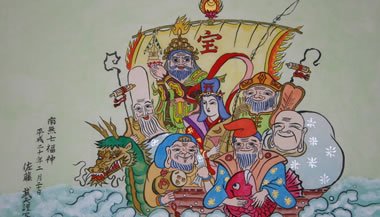Shichi Fukujin are the seven gods of luck and fortune that are part of Japanese mythology and tradition. In addition to being considered luck and fortune, they are believed to be precursors of knowledge, wealth and health.
The seven gods in his ark, Takarabune, are related to the New Year in Japan and are normally used to bring gifts, fortune, happiness and luck. The most common superstition is to place this image under your pillow on New Year’s Day to start the year in the best possible way.
Benzaiten She
Is the only goddess within Shichi Fukujin, and is considered a goddess of art and delicacy. Furthermore, she is a goddess of everything that flows like water, voice and music. His image is always associated with a musical instrument, placed in his hands. Sometimes it is placed on a dragon or a snake.
Bishamon
This is the god of war, the distributor of wealth, he is always dressed in war clothes and holds a spear in his hand. He conveys the teachings of Buddha, and for that reason he has the assignment of a warrior, but he is a defender of peace and Buddhist law. Considered the protector of diseases and demons, he brings good luck in the battle, and when his figure is placed in houses, he scares off thieves and defends the family’s assets.
Daikoku
The happiest of gods, Daikoku is the god of prosperity and abundance. Usually represented by a fat man in ancient hunting clothes, he is considered a patron of farmers, for bringing wealth and a lot of production, in addition to protecting the harvest, and for this reason he sits on sacks of rice. He is represented with a wooden hammer in his hand and his image brings professional progress and enrichment.
Ebisu He
Is the god of sincerity and integrity, protector of fishermen, navigators and traders and of children’s health, and guardian of sea voyages. It also symbolizes honesty and work, and is represented in the figure of a fisherman with a bowl and a fishing rod. Having your figure at home or at a business establishment can bring prosperity and business success. The god Ebisu does not give the fish, but teaches how to fish.
Fukurokuju
Like the translation of his own name, Fukurokuju is the god of happiness (fuku), wealth (roku) and longevity (ju). Legend has it that this was a Chinese sage and that is why he is represented and dressed as such, besides having a long forehead, showing his wisdom. In his hand he holds a sacred scepter or a staff on which a parchment hangs, and he also brings animals with him to represent longevity. He is the only one capable of raising the dead and of surviving without eating. A person presented with a statuette of this god tends to become popular.
Hotei He
Is the lord of magnanimity and human generosity, portrayed as a Chinese monk. He is always in a good mood, he always laughs and that is why he brings health and happiness, since he is always satisfied with what he has. Generally represented with a huge belly, short, bald and with clothes falling over his shoulders, he was a god much loved by the people. Those who appreciate the painting or have the Hotei figurine are free from worries.
Jurojin
The god of longevity, wisdom and good luck, brings with him a staff with a parchment tied to it, with words about everyone’s life and the record of good and bad deeds committed. He is also considered the god of ecology, as he is almost always depicted with an animal, a symbol of long life. Usually dressed as a Chinese sage, with an elongated head, just like Fukurokuju, so they are sometimes confused. Those who appreciate the image of Jurojin have wisdom and longevity.

